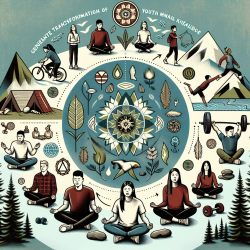Embracing Indigenous Wisdom for Youth Mental Health
In the quest to improve youth mental health outcomes, one powerful approach stands out: integrating Indigenous knowledge and worldviews. The recent research article, "Centering Indigenous Knowledges and Worldviews: Applying the Indigenist Ecological Systems Model to Youth Mental Health and Wellness Research and Programs," sheds light on how this can be achieved. This article presents a compelling case for using the Indigenist Ecological Systems Model, which aligns with Indigenous perspectives on health and wellness, to foster holistic well-being among youth.
The Indigenist Ecological Systems Model: A Holistic Approach
At the heart of this model is the understanding that youth development is influenced by interconnected environmental levels, from historical and cultural contexts to immediate and surrounding environments. This model is a departure from deficit-based approaches, which often overlook the strengths inherent in Indigenous communities. Instead, it emphasizes the importance of cultural continuity, community engagement, and the nurturing of intergenerational relationships.
Implementing Strengths-Based Programs
Practitioners can draw inspiration from several case examples highlighted in the research:
- Camp Pigaaq: This program for Alaska Native youth emphasizes cultural knowledge and traditional skills, resulting in increased positive mood and a sense of belonging.
- Te Kōhanga Reo: A Māori immersion language preschool initiative that strengthens cultural identity and language skills among Māori youth in New Zealand.
- Thiwáhe Gluwáš’akapi Program: This intervention integrates family and kinship ties to promote mental health and wellness among Indigenous youth through culturally relevant curricula.
Opportunities for Further Research
The research underscores the need for further exploration into Indigenous-led solutions that enhance community strengths. Practitioners are encouraged to consider how these models can be adapted and applied in their own contexts. By focusing on strengths-based solutions, we can promote not only individual well-being but also the wellness of entire communities.
Conclusion
As practitioners, embracing the Indigenist Ecological Systems Model offers a pathway to more effective and culturally resonant mental health interventions. By centering Indigenous knowledges and worldviews, we can support youth in achieving holistic health and well-being. To dive deeper into the original research, please follow this link: Centering Indigenous Knowledges and Worldviews: Applying the Indigenist Ecological Systems Model to Youth Mental Health and Wellness Research and Programs.










